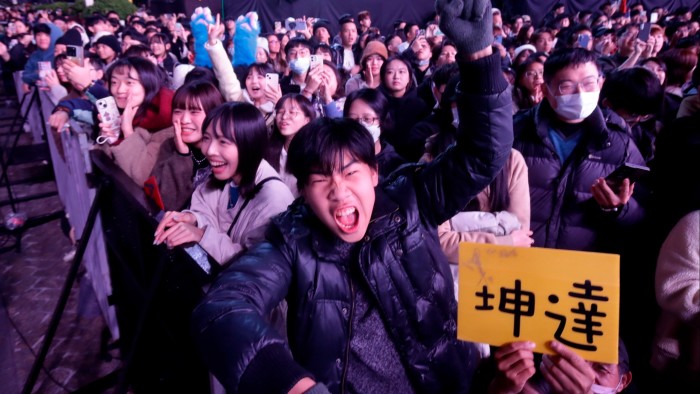Stay informed with free updates
Simply sign up to the Chinese politics & policy myFT Digest — delivered directly to your inbox.
China is signing growing numbers of Taiwanese people up for local resident or even identity cards, in a drive to incorporate them into its society that is setting off alarm bells in Taipei.
Taiwan government officials said that Beijing had become “focused” on getting visiting Taiwanese to apply for Chinese resident cards, bank accounts and local mobile phone numbers — known as the “three documents” — with many then being given the local identity cards which are reserved for citizens.
“We are concerned that when more and more Taiwanese have Chinese citizenship, it will compromise our jurisdiction,” said a senior China policy official in Taipei. “If a Taiwanese with a Chinese ID was involved in an incident here, China could say they need to take care of the issue because the person is their citizen and intervene in our domestic affairs.”
The push is seen as particularly concerning as China is steadily expanding a multi-faceted pressure campaign against Taiwan. Beijing claims the island as part of its territory and threatens to take it by force if Taipei resists unification indefinitely.
Similar tactics of giving local status to citizens from neighbouring countries has long been part of Russia’s playbook. Moscow issued passports to eastern Ukrainians who moved to Russia after it helped to orchestrate conflict in the region in 2014. Russia also gave citizenship to residents of two breakaway regions of Georgia and then cited the need to protect them as a pretext for a brief 2008 war.
Taiwanese officials said China’s push to give more Taiwanese local papers had not reached that level yet, but it posed a risk of the same nature.
The issue surfaced when a Taiwanese video blogger’s documentary in late December suggested hundreds of thousands of Taiwanese had Chinese identity papers. Lin Chin-cheng, a Taiwanese who heads a Chinese government-backed start-up centre for youth entrepreneurs from Taiwan in the Chinese city of Quanzhou, claims in the film that about 200,000 Taiwanese hold Chinese IDs.
That claim could not be confirmed. But government officials, tourists and businesspeople from Taiwan said visitors to China in recent months had been asked to fill in applications for the “three documents”.
At China’s centenary celebrations for the Whampoa Military Academy last year, veterans from Taiwan were signed up at special desks, participants said. The Straits Forum, an annual event which is part of the Chinese Communist party’s United Front tactics to engage Taiwanese not openly hostile to it, also featured “three documents” application desks. Three Taiwanese people who recently travelled to China on a ferry from Taiwan-controlled Kinmen said that arrival procedures in Xiamen now included filling in forms which they only later understood were applications for those documents.
The resident card for Taiwanese which is part of the “three documents” does not amount to Chinese citizenship — Beijing presents it as a preferential measure to allow Taiwanese equal access to local services.
But Taipei fears it is becoming the entry point into citizen status. “The local ID frequently is the immediate next step, or is even directly offered instead of the resident card,” said a national security official. Taiwan officials added that local IDs were being heavily promoted as an opportunity for better conditions on loans or home sales.
Under Taiwanese law, citizens who take up a Chinese ID will have their Taiwanese household registration revoked. But Taipei struggles to effectively monitor its citizens’ actions in China as Beijing has cut off almost all official communication with the Taiwanese government though cross-Strait travel, trade and investment built over decades continue. According to the government’s statistics office, 217,000 Taiwanese worked in China as of 2023 — only half of the numbers seen at the peak a decade ago, but still a 22 per cent increase over the previous year.
Taiwan president Lai Ching-te last week warned the public not to be lured in by the supposed short-term gain of Chinese papers.
“We have an old saying in Taiwan: Free things turn out very costly. That is very true,” he told reporters after his New Year address. Lai pointed to the many Chinese people taking enormous risks to illegally migrate to other nations, arguing that taking up a Chinese ID at this time was absurd for a citizen of a democratic country and could prove “the end of your road into the world”.
The ministry of foreign affairs in Beijing did not respond to a request for comment.
Read the full article here




